CLESE Transcends Barriers
From Working to Preserve Our Heritage: The Incredible Legacy of Greek-American Community Services.
"CLESE was recognized as a model organization at the local, state, and national levels. No other city had an organization like ours, and some wanted to emulate CLESE in other cities. The uniqueness and the unity of purpose amongst organizations representing diverse cultures and languages emanating from all parts of the world were key to our success.
Despite our cultural differences, we worked well together in the spirit of mutual respect, friendship, and collaboration. I considered my involvement with CLESE to be among my high points during this period. The communities we collectively represented were in different stages of evolution ranging from newly arrived immigrants and refugees to those who may have been here for decades or more. We shared ideas, strategies, and information either collectively or one-on-one. We provided training, support, and technical assistance to each other for the common benefit of the elderly. At other times we collaborated on programs, outreach activities, and advocacy efforts. If a member agency was in need, we collectively did whatever we could to help.
CLESE received consistent funding from the Illinois Department on Aging through several grant programs. One grant helped underwrite the executive director position by funding CLESE to offer training and technical assistance to member agencies in need of help with CCP or other IDOA-funded programs.
CLESE was also supported by the city and state health departments, and the Illinois Secretary of State’s Literacy Office. Programs that were made possible through these funding streams include outreach, health education and screenings, elder abuse and neglect, Alzheimer’s disease demonstration programs, citizenship classes, and refugee programs. CLESE created a model English as a Second Language (ESL) program focused on non-English speaking elderly and was lauded for its success with this. The curriculum was focused on real-life needs and interactions alongside a civics component that helped seniors prepare for a citizenship test if they intended to apply for citizenship.
The CLESE model since inception was to enable and support member agencies to provide services, and not for CLESE to become a service provider itself. Usually, CLESE received a grant which was then subcontracted to the organization(s) participating in that program. CLESE coordinated and monitored the programs, disbursed and accounted for the funds, and reported back to the appropriate funding sources. Beth O’Grady as program manager and later as the assistant director did most of the technical assistance and training. Eventually, Taiqin Dong joined CLESE as a program manager for health programs. Beth was a great person to work with. She was positive, empathetic, and professional and had a great sense of humor. She succeeded Rosemary as executive director upon her retirement. Taiqin was always a pleasure to work with.
In addition to being a founder, I served as president of CLESE on two occasions. The first was when Danguale resigned as president, and as vice president, I stepped in. This was shortly after we came into our own as an organization. After this term, I was asked by the nominating committee to be vice president for another term. Sue Kang was elected president, and we made a great team. The CLESE bylaws specified that the vice president was also the president-elect.
When I assumed the president’s post, Isaac Toma became vice president. Isaac was the president of the Assyrian National Council of Illinois and owner of Ashur’s Sports Lounge in Andersonville. Awilda Gonzalez, program director of ASI, became treasurer, and San O, secretary. San was co-founder and program director of the Southeast Asia Center. After Isaac, Awilda became president, followed by Santosh Kumar, executive director of Metropolitan Asian Family Services. CLESE officers served two-year terms.
The ceremonial gavel was passed during the annual membership dinner meeting attended by representatives of CLESE’s member agencies, IDOA and CDOA leaders, funders, and friends. The meetings included programmatic and financial reports and presentations of awards to supporters.
Each year, the event was held in a different ethnic community restaurant. I recall annual meetings that were in Chinese, Greek, Bosnian, Korean, Swedish, Assyrian, Italian, Polish, and Puerto Rican restaurants. During my terms as president, we had lunch “meetings after the meetings” at a restaurant, usually of the same ethnicity as the member agency that hosted the monthly board meeting. The annual December meeting featured a potluck luncheon following the board meeting. In response to requests, I usually brought baklava and diples as the Greek contribution to the lunch.
Special guests attending the CLESE Annual Meeting, held on May 8, 1991, at Ann Sather’s Restaurant, 5207 N. Clark, illustrated the broad relationships the coalition had built and cultivated across a spectrum of federal, state, and local agencies and private funders. As president, I welcomed the guests to the meeting that evening and Rosemary prepared the list of those attending for me to use in the introductions. They were Eli Lipschultz, regional program director of the Administration on Aging; Pat Michalski, special assistant to Governor Jim Edgar for ethnic affairs; Suzanne Grubb, Nancy Lowder, and Mary Hill (Illinois Department on Aging staff working on the CLESE Home Care Project); Jan Logan, director of planning for the Chicago Department on Aging; Michael Marcus, Community Trust senior staff associate focused on elderly; Marilyn Hennessey, president of the Retirement Research Foundation; and Ron Elling, executive director of the Metropolitan Chicago Coalition on Aging. Next to Ron’s name, Rosemary wrote, “Special thanks to Ron for opening his office to us. I don’t know where we would have been without him.” At the time, MCCOA was providing CLESE with office space within its 53 W. Jackson office.
From the largest of agencies to the smallest of groups, when there were matters of common concern, CLESE members spoke with a unified voice on the matter at hand. CLESE lobbied for increased reimbursement rates for homemakers and adult day care services, funding for translating provided by organizations called upon for help when case managers encountered non-English speaking elderly, and ethnic-specific CCP contracts.
A common concern of many CLESE member agencies was the large number of rejects in invoicing that CCP providers were experiencing. This created financial hardships for organizations due to delays involved in clearing each rejection. CLESE helped agencies to troubleshoot and resubmit invoices to IDOA for payment. One example of that was a meeting CLESE arranged with IDOA at the State of Illinois Building to address rejects. In addition to an IDOA presentation, providers brought their rejects to the meeting to get them processed onsite.
CLESE and its member agencies were presenters at many conferences including the National Council on Aging, the American Society on Aging, and others. Rosemary served as a member of the Illinois Council on Aging and as a member of several boards, committees, or ad-hoc groups. I recall attending or presenting at several conferences with CLESE colleagues including a National Conference on Aging conference at Disneyland in Anaheim, California, and American Society on Aging conferences in Washington DC, Chicago, and Rosemont, IL among others. CLESE was involved in activities related to several White House Conferences on Aging including hosting a mini-conference at the Chinese American Service League that was attended by the director of the U.S. Administration on Aging.
For a few years, CLESE hosted an annual gathering in June called “Around the World with CLESE.” Although a fundraiser, it was also a cultural and social event for older adults served by member organizations. The events featured traditional ethnic food and entertainment provided by member organizations. To represent the Greek community, GACS arranged for food donations from Hellas Bakery, Greek Islands, Greek Taverna, Pegasus, and Rodity’s restaurants which included pastichio, moussaka, dolmades, diples, and baklava. Beyond the “Around the World with CLESE” events, CLESE did not engage in fundraising activities or solicitations to avoid being in competition with its member agencies for donations. Basic expenses were covered by membership dues and salaries and program costs were funded through grants.
On April 24, 2003, CLESE hosted “Vision 2005,” an all-day retreat for CLESE member agencies held at the Chicago Yacht Club. Facilitated by Jean Blaser who by then had retired from IDOA, the retreat provided great views and food, and an opportunity for CLESE members to mingle. The invitation asked: “Take a look into the future. What will life be like in 2005, for a 60-year, for a 70-year-old? 80? 90? What will the role of your agency be? What will be the role of CLESE? Join us in welcoming Spring as we gaze across the waters of Lake Michigan and build a vision for the future.”
In the summer of 2003, in lockstep with adult day care providers, CLESE became a leading advocate for an increase in reimbursement rates for adult day services in Illinois. CLESE arranged north-side and south-side meetings with state legislators. I participated in a July 18 meeting with state representative Larry McKeon and a July 30 meeting with state senator Carol Ronan and state representative Harry Osterman. In August, CLESE arranged meetings for south side member agencies with then-state senator Barack Obama and Representative Barbara Flynn Currie, the Illinois House majority leader. Since I was then senior services director at the Hyde Park Neighborhood Club and knew these legislators, having worked with them on other matters, I arranged these meetings. U.S. Representative Jan Schakowsky, who represented the 9th congressional district, and of this writing still does, was also a supporter of CLESE and its member agencies and attended various meetings and events.
In November 2003, CLESE held a meeting of ethnic Community Care Program providers with the Illinois state comptroller’s office to discuss the state’s cash flow problem with providers. They offered to write letters to providers’ banks explaining the delayed payments. The comptroller’s website would offer updates on the status of payments.
When Rosemary retired in December 2003, the CLESE board held a farewell luncheon in her honor at the Greek Islands restaurant. Beth O’Grady assumed the role of executive director and Taiqin took over Beth’s duties. After Beth retired, Marta Pereyra became executive director of CLESE and remains in that position as of January 2022.
On September 23, 2004, CLESE held its Fifteenth Anniversary Dinner and honored Ed Silverman, Illinois Department of Human Services; David Mui, Chicago Department on Aging; Marilyn Hennessey, Retirement Research Foundation; Johnathon Lavin, Suburban Cook County Agency on Aging; and Jean Blaser, formerly of IDOA.
On September 30, 2014, CLESE celebrated its 25th Anniversary with a gala dinner held at White Eagle Banquets, Niles, IL. Although I would have attended had I known about the event, I did not receive the invitation until a week after the event occurred.
An appreciation dated April 1, 2021, and posted on the RRF Foundation for Aging website (accessed December 7, 2021), announced the passing of Marilyn Hennessey, former president of the Retirement Research Foundation. In the article, Ruth Ann Watkins, the Board of Trustees Chair, and Mary O’Donnell, the president stated: 'Professionally, she was instrumental in the launch of the Coalition of Limited English-Speaking Elderly (CLESE), nurturing its growth from 12 to 50 ethnic service providers. Widely acclaimed for its innovative work, the CLESE network annually assists 200,000 older immigrants and refugees and works in 80 different languages.'”
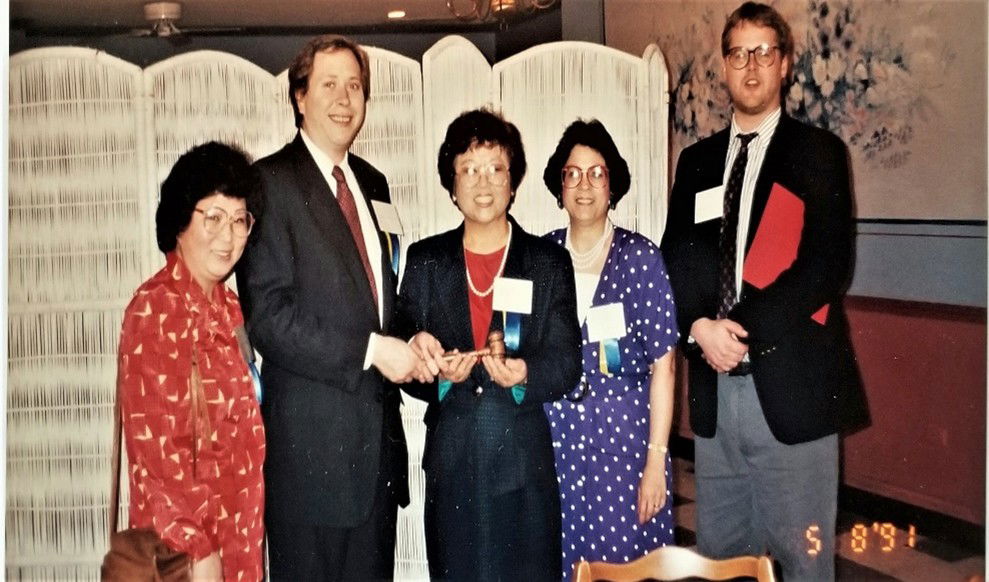
The passing of the ceremonial gavel from outgoing president John Psiharis to incoming president Sue Kang. New officers were: Pictured: (L-R): Suey-Lee Chang (secretary), Awilda Gonzalez (treasurer), and Bruce Dean (vice president). May 8, 1991.
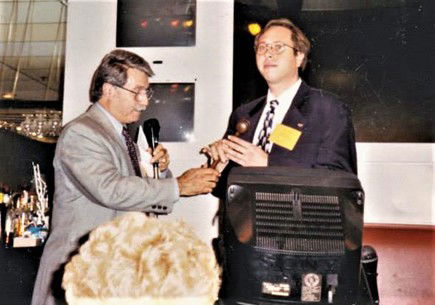
Outgoing president Issac Toma passes the ceremonial gavel to incoming president John Psiharis. This was for my second term as president. Circa 1996. John Psiharis collection.
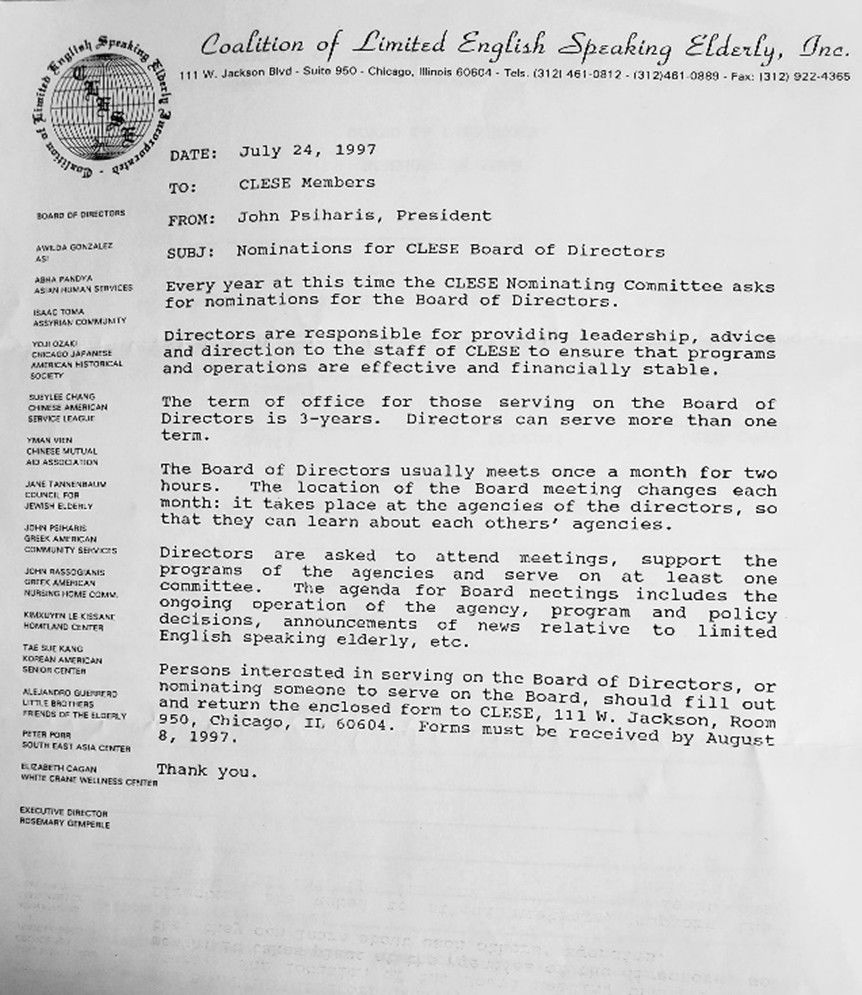
A memo to CLESE members seeking nominations to the Board of Directors. July 24, 1997. The letterhead lists the CLESE Board of Directors at the time. John Psiharis collection.
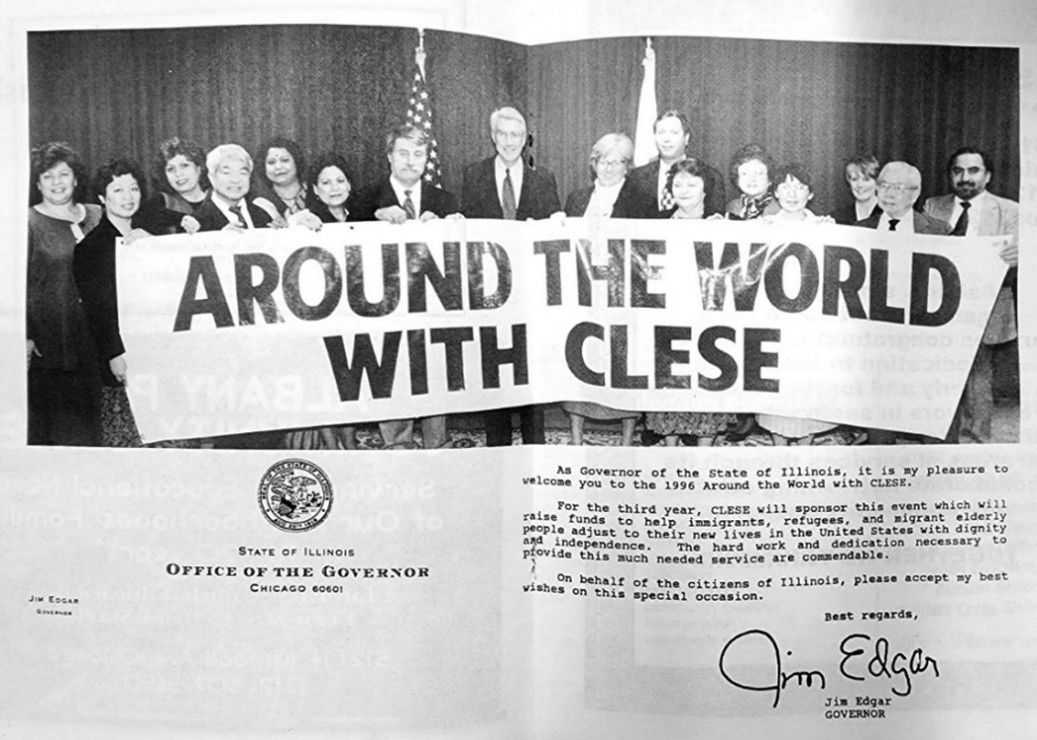
CLESE Board members invite Governor Jim Edgar to the 1996 “Around the World with CLESE” event. Pictured (L-R): Sylvia Salapatas-Poulikakos, Lucy Le-Kissane, Angelike Mountanis, Qua Tran, Santosh Kumar, Awilda Gonzalez, Isaac Toma, Governor Jim Edgar, Rosemary Gemperle, John Psiharis, unknown, Sue Kang, San O, Beth O’Grady, Yoji Ozaki, Alejandro Guerrero. Circa 1996. “Around the World with CLESE” program booklet. John Psiharis collection.
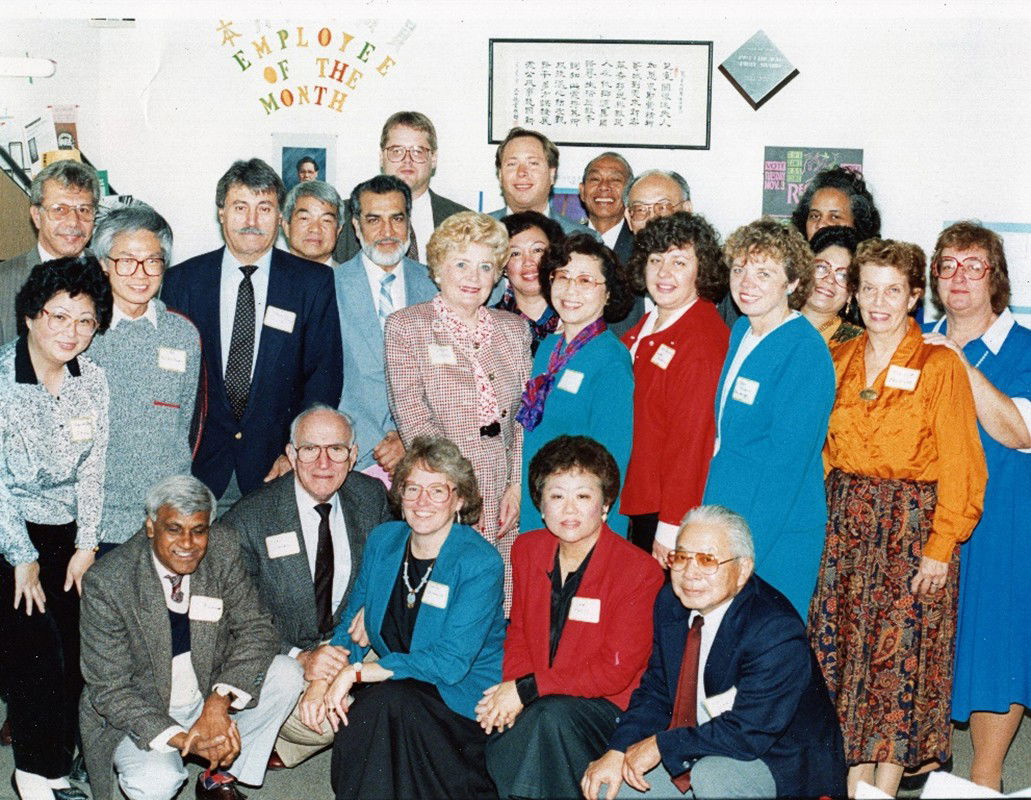
A CLESE Board meeting at Chinese American Service League with Maralee Lindley, director of the Illinois Department on Aging, in attendance. Pictured (L-R): First row: Unknown, John Nimrod, Rosemary Gemperle, Sue Kang, Yoji Ozaki. Second row: Suey-Lee Chang, unknown, unknown, Isaac Toma, Qua Tran, unknown, Bruce Dean, Maralee Lindley, Lucy Le-Kissane, John Psiharis, Bernarda Wong, Peter Laylo, Rev. Masaru Nambu, Sylvia Salapatas, Karen Popowski, Rebecca Cruz, Awilda Gonzalez, unknown, and Judith Matthews. Date unknown. John Psiharis collection.